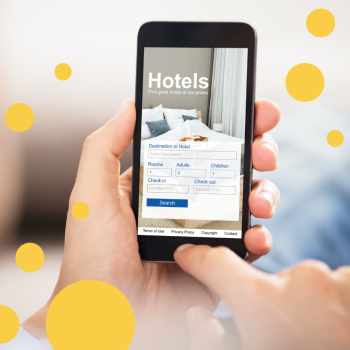
What do you think of first when it comes to controversial issues in the hotel industry? The discussion on rate parity is definitely at the top of the list. It’s been argued in court in many countries for years now, and also among hoteliers, opinions differ.
Are OTAs allowed to contractually obligate hotels to conform to rate parity? Should that be allowed? And what would the world of sales look like without parity clauses?
Marco Baurdoux, Elisha Schoppig, and Daniel Brand from Hotel-Spider tackle this question in our livestream on the topic of rate parity in 2023.
Here’s a summary of the most important points of discussion, as well as conclusion that may surprise some hoteliers.
What is rate parity?
Before we properly jump into the debate, we need to define the main topic. For this, Elisha stopped by OTA Insight, which is one of the leading providers of revenue management solutions for the hotel industry.
We got the following explanation: “Rate parity means maintaining the same prices across all sales channels. If the same price is given on the hotel website, the OTA and from third-party providers, then we have rate parity.”
This concept is easy to understand, but can be difficult to put into practice for different reasons.
Which begs the question: Should hoteliers even try to maintain price parity? We need to consider legal elements and marketing aspects here.

The legal side of rate parity
In many countries, legislators and politicians are debating the legal and antitrust aspects of adding a parity clause in contracts between OTAs and hotels. The main argument is often that committing to price parity means hotels are deprived of the power to make decisions about their own prices. Which is why lots of hoteliers are against clauses like this.
This has lead to these clauses being prohibited in Germany, so hotels are allowed to display different prices on their own website than on OTAs. Switzerland is still awaiting a decision.
A quick comment on that: Neither the livestream nor this article constitutes legal advice. Please contact a lawyer for any concrete legal advice.
The aim of this content is to share current information, and to consider rate parity from a marketing perspective.
Let’s get back to it...
Rate parity as a marketing tool
Price parity can affect your hotel’s marketing and sales in different ways. We’ll take a look at the three most important points here.
OTAs as a marketing partner.
Lots of hoteliers just see OTAs as booking channels. But they're much more than that, and strong collaboration provides hotels with numerous benefits.
Lots of travelers use OTAs as a research tool while planning their trip. They find a large selection of hotels in their destination there. They often discover hotels that they wouldn't have found using search engines. Because OTAs reach a really wide audience, they drastically increase the reach of their hotel partners.
Although it’s easy to compare prices, facilities, and offers on OTAs, lots of users also look at the hotel’s own website before booking. According to a Cornell study, this billboard effect can increase your chances of getting a direct booking.
Parity from the OTAs point of view
Every day, countless travelers make bookings on OTAs. One reason is that customers trust them, and they often provide a better booking experience than some hotel websites. And over the last few years, OTAs have invested in optimizing their booking process to offer customers the best possible experience on all end devices. That isn't just good for OTAs, but also the hotels that are listed on them.
When it comes to rate parity, the OTAs way of thinking makes sense. They’re asking themselves why you would use their platform and reach for a room that’s offered cheaper on other channels.
Logically, they would favor hotels that offer the best prices with them, and give them better positioning. Guests who compare room rates on different websites would book their room more frequently on OTAs. For hotels that don’t adhere to rate parity, this would result in worse positioning, less reach, and overall declining sales figures.
Without rate parity, will there be confusion?
Most guests only book a hotel stay a few times a year. They prefer research and a booking experience that is as uncomplicated as possible. Usually they turn to meta search sites and OTAs as a starting point.
If, in addition to a large range of hotels, there are lots of different prices for each room, this can quickly lead to confusion. They give the guest a reason to keep looking, since they might find an even better offer somewhere else.
Unfortunately, this often results in the traveler booking via their trusted OTA to be on the safe side. In the worst case, they even decide in favor of the competition, which offers parity and thus more transparent pricing.

Our conclusion on rate parity
As you can see, OTAs are powerful partners, and they have the upper hand when it comes to rate parity. Even if you’re not contractually obligated to adhere to rate parity, OTAs can make it extremely unattractive if you don't stick to it. Plus, you risk alienating potential guests and even losing them because of disparity.
So it’s worth considering whether your business depends on OTAs. Can you afford to get fewer reservations from these channels? Where would your reservations come from instead?
For many hotels, it quickly becomes clear that OTAs are an important distribution partner with whom they would rather work productively than argue. So the conclusion for most establishments will be to stick to rate parity, and cultivate a good relationship with OTAs so that they can continue to benefit from the advantages they provide.
Differentiation through added value
Of course, this doesn't mean you should give up your endeavor to get more direct bookings. If you’ve decided on rate parity, you can offer direct bookers added value in different ways. In the long run, it’s a more effective way of differentiating yourself, because price alone is not the only deciding factor when choosing a hotel.
Here are some examples of benefits to offer for booking exclusively through your website:
- Special booking rules or restrictions
- Better cancellation conditions
- Discounted meal packages
- Other additional services:
• Breakfast included
• Flight transfers
• Welcome drink
• Water bottles in the room
• Late checkout
This will help you stand out from the crowd, generate more direct bookings, and offer guests a better stay.
Although many people give it a bad reputation, price parity itself isn't a bad thing. It provides benefits to OTAs, hotels, and even guests.
Nevertheless, you may feel that you are losing direct bookings because of forced parity. Or they miss having complete control of their pricing across all channels. And that’s an important part of the debate.
In the end, you need to weigh and test the pros and cons individually for your hotel. There is no generalized answer on whether you should work with parity or not.
Go through the points in the article at your leisure and consider your own position on rate parity: Is it a necessary evil or a good opportunity to increase your reach and revenue?


